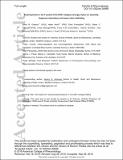Polymorphisms in the F pocket of HLA-B27 subtypes strongly affect assembly, chaperone interactions and heavy-chain misfolding
Abstract
Objective - HLA-B27 is associated with the inflammatory spondyloarthropathies (SpAs). Of significance, subtypes HLA-B*27:06 and HLA-B*27:09 are not associated with the SpAs. These subtypes primarily differ from the HLA-B*27:05 disease associated allele at residues 114 and 116 of the heavy chain, part of the F pocket of the antigen-binding groove. Dimerisation of HLA-B27 during assembly has been implicated in disease onset. This study investigated the factors influencing differences in dimerisation between disease associated and non-associated HLA-B27 alleles. Methods – HLA-B*27:05 and mutants resembling the HLA-B*27:06 and 09 subtypes were expressed in the rat C58 T cell line, the human CEM T cell line and its calnexin deficient variant CEM.NKR. Immunoprecipitation, pulse chase, flow cytometry and immunoblotting were performed to study the assembly kinetics, heavy chain dimerisation and chaperone associations. Results - By expressing HLA-B*27:05, 06-like and 09 alleles on a restrictive rat TAP peptide transporter background, we demonstrate that a tyrosine expressed at p116 or together with an aspartic acid residue at p114 inhibited HLA-B27 dimerisation and increased the assembly rate. F pocket residues alter the associations with chaperones of the early MHC class I folding pathway. Calnexin was demonstrated to participate in endoplasmic reticulum (ER) stress mediated degradation of dimers, whereas the oxidoreductase ERp57 does not appear to influence dimerization. Conclusion - Residues within the F pocket of the peptide-binding groove differing between disease-associated and non-disease-associated HLA-B27 subtypes can influence the assembly process and heavy chain dimerisation, events which have been linked to the initiation of disease pathogenesis.
Citation
Guiliano , D B , North , H , Panayoitou , E , Campbell , E C , McHugh , K , Cooke , F G M , Silvestre , M , Bowness , P , Powis , S J & Antoniou , A N 2017 , ' Polymorphisms in the F pocket of HLA-B27 subtypes strongly affect assembly, chaperone interactions and heavy-chain misfolding ' , Arthritis & Rheumatology , vol. 69 , no. 3 , pp. 610-621 . https://doi.org/10.1002/art.39948
Publication
Arthritis & Rheumatology
Status
Peer reviewed
ISSN
2326-5205Type
Journal article
Description
This work was in part funded by awards to Dr Antoniou (Arthritis Research UK Fellowship 15293) and Dr Powis (Scottish Government Chief Scientist Office ETM/56).Collections
Items in the St Andrews Research Repository are protected by copyright, with all rights reserved, unless otherwise indicated.

